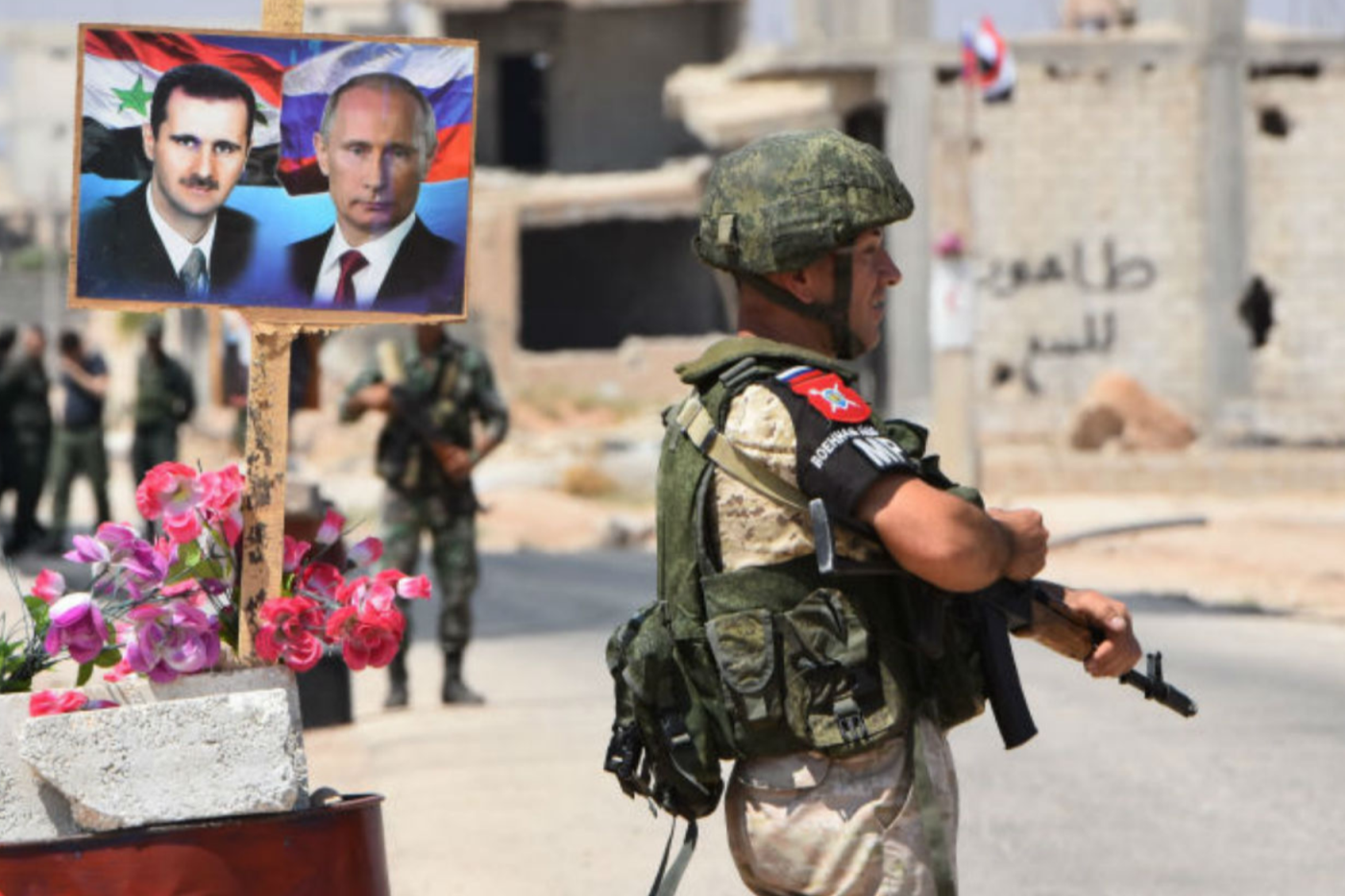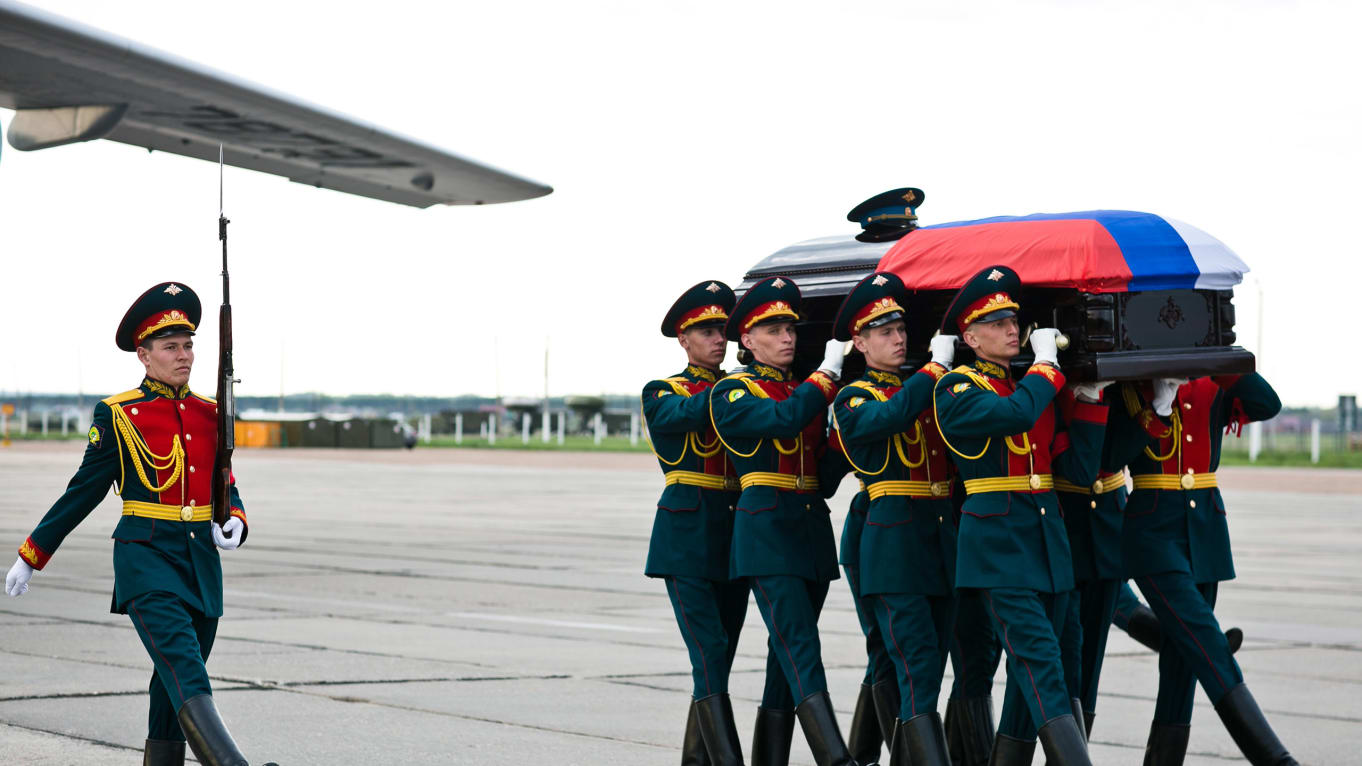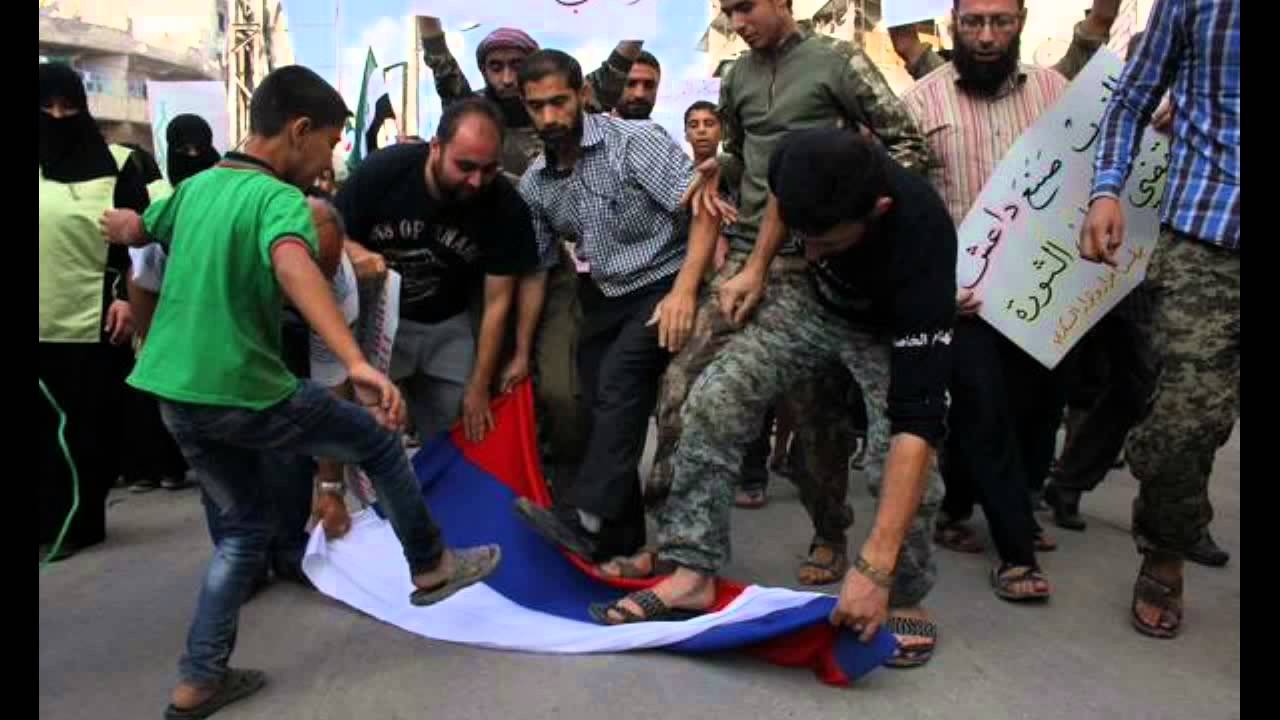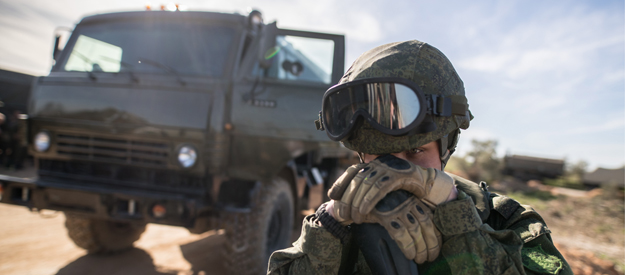Achievements of President Putin’s four-year policy in the Middle East
President Putin agreed to Turkey’s seizure of Syria’s border area and told President Erdogan that he was ready to send Russian soldiers to the Syrian-Turkish border to help the Turks monitor the expulsion of the Kurds from lands that they had inhabited for centuries. This is the crux of the document signed last month in Sochi by Putin and Erdogan. All the other matters revolved around platitudes and general promises.
It goes without saying that the agreement was signed without the participation of the Kurds and Syrians, who are still nominal owners of the lands whose “political unity and territorial integrity” the Russian and Turkish leaders intend to maintain, judging by the Sochi Memorandum. Pursuant to the understanding, Turkey will terminate the military operation against the Kurds if they leave the “security zone” designated in the memorandum by the established deadlines.

Russian military police in Syria
After the Russian-Turkish partition of the Syrian lands, international mass media said that Putin had consolidated his position significantly in the Middle East. And it is true that the transaction between Putin and Erdogan implies some changes in the region:
— the Turks will be able to dislodge the Kurds they abhor from their borders and get rid of the Syrian refugees in Turkey by resettling them on the land in Syrian once it is freed of the Kurds;
— President Assad will be able to recovers positions lost in the North-East of Syria;
— the Iranians will be able to exploit the consolidation of Assad’s positions to achieve their own objectives in Syria;
— the Americans will be able to wash their hands of the whole business and absolve themselves of any responsibility for the fate of the unfortunate Kurds.
At the same time, the USA will retain control over the oil fields in the province of Deir ez-Zur. In addition, the operation to eliminate Abu Bakr al-Baghdadi demonstrates unambiguously America’s plans to retain influence in the region, and its ability to intervene in the situation at its discretion even in the areas abandoned by American soldiers.
And what will Russia obtain as a result of the transaction in Sochi and in general from its participation in the Syrian war, other than temporary satisfaction of Putin’s geopolitical ambitions?
The Western press writes that Putin is becoming a “key player” in the Middle East. Admittedly, for the time being it is unclear how he will cope with this role, but in general the motif will be based on the following line: “The USA lost ground, Russia took over”.
However, the news on the successful raid to neutralise the leader of the terrorists has once again diverted the spotlight from Putin’s successes to Trump’s triumphs. This elicited a pained reaction from the Russian military and bureaucrats, who immediately expressed their doubts that al-Baghdadi was actually dead this time. Incidentally, the point here is not the person considered to be the victor by the mass media at the current moment, but instead the actual approach adopted by experts when assessing the situation. Foreign analysts consider developments from the prism of the standard tactical chess game for the Middle East — naturally, they don’t consider Russia’s long-term or short-term interests. They write “Russia”, but actually mean “Putin and his military contingent”.
However, such questions are bound to be raised in Russia. How many human lives have been lost over the past four years? How much is the operation in Syria actually costing Russia? How should one assess the consequences of Russia’s armed intervention into an internal Muslim conflict on behalf of one the players, leading in the process to victims among the defenceless civilian population and significant destruction? How do people in the Middle East assess statements from Russia’s leadership that one of Russia’s goals there is to test out weapons and train soldiers? Will participation in the bloody Syrian conflict result in an outbreak of terrorism, in particular, which accesses Russia from Afghanistan? Why is Russia becoming entangled in complicated regional clashes again and again, acting on anyone’s behalf, to the detriment of its own national interest? For what end has Russia assumed the mission of controlling the Turkish-Syrian border, protecting the interests of a NATO member state and engaging in an overt conflict with the Kurds? How will our country pay for all this?

Medvedev Sergei/TASS via ZUMA
Incidentally, the document signed by Putin and Erdogan was called a “memorandum”, in Latin – this means “what must be remembered”. And this document will have to be recalled not only by the participants in the pompous signing ceremony in Sochi.
And so is what we need to remember — the key achievements of Russia’s presence in the region for four years:
1. Notwithstanding the rosy picture of Putin’s triumphal procession through the Middle East depicted by Russian propaganda, in actual fact, the Kremlin’s actions create a risk for the entire region:
- De facto Russia has become Iran’s military ally in the region and at the same time is offering to supply the S-400 anti-aircraft missile system to its main adversary, Saudi Arabia;
- Russia claims not to know if Iran was behind the targeted and successful attack on a major Saudi oil facility. However, everyone in Saudi Arabia is convinced that Iran was to blame;
- Saudi Arabia and other Persian Gulf countries proactively support the jihadists that the Russian army is fighting in Syria. They are also helping extremists in the Caucasus and Central Asia. Despite this fact, Russia is offering major arms supply contracts to these countries;
- Russia constantly talks about Syria’s sovereignty, but in actual fact is not preventing the Turkish military operation in the north of Syria and the division of the country into zones of influence;
- Russia is offering Lebanon, one of the most unstable countries in the region, an opportunity to acquire weapons for a billion dollars on the basis of a 15-year interest-free loan. However, in view of the well-known catastrophic financial position of this country, the money will not be returned;
- In 2015, when the military forces were sent to Syria, Russia’s leadership promised that the operation would last less than a year and announced the withdrawal of the troops on several occasions. However, now Putin says that the Russian army will remain in Syria until Syria’s leadership asks them to leave, — in other words, indefinitely.
2. Russia’s participation in Syria’s civil war, the bombing campaign by Russia’s air force, leading led to the loss of countless lives, Russia’s policy in the region, which to all intents and purposes defies any logical explanation — all these factors have ripped to shreds the country’s authority in the Middle East. For example, in 2007 positive and negative attitudes about Russia in Jordan, one of the most moderate and peaceful countries in the region, were evenly split, whereas in 2017 93% of respondents had a negative view. Perceptions of Russia have also deteriorated in other Middle Eastern countries.
In a bid to redress the situation, Russia decided to sell weapons in the region to everyone at one go. For example, to such “best enemies” as Saudi Arabia and Turkey.
And what about Iran then? For we must not let our “charges” in Tehran become offended over supplies of Russian weapons to Iran’s enemies. And that is why the Kremlin decided to assume all the expenses on supporting Assad, and now Iran can use the resources saved in Syria to fund its expansion into other neighbouring countries. It is precisely actual intervention in the internal affairs of Iraq, Lebanon, Yemen and Syria that is constantly opposed by Russia, citing the inadmissibility of the “colour revolutions”. Here, however, it turns a blind eye to such developments. Moreover Russia makes a profit from the sale of weapons to warring countries in the Middle East, which further escalates conflicts, while the proceeds again end up with our “charges’ in Iran, in other words, one of the participants in the conflict. Participation in this vicious circle for Russia cannot be restricted to the Middle East — rogue states all over the world are looking for “partners”.

Anti-Russian rally in Syria
3. Putin started displaying increasing interest in the Middle East after the Arab Spring. He perceived this to be a foreign conspiracy, a continuation of the series of “colour revolutions” in the post-Soviet space, even though it was crystal clear that all these revolutions had been driven primarily by internal factors: corruption, price growth, a sense of internal backwardness, people’s fear of tomorrow, the desire of the educated class to secure civil freedoms.
The Kremlin has been seized by paranoia that a “colour revolution”, for example in the form of a demand for honest elections, might also happen in Russia, while any rapprochement with Europe and the USA would jeopardise the immutability of the current regime in Russia.
The flight by Yanukovych from Ukraine fits in perfectly with Putin’s concept.
For that matter, to all intents and purposes Iran soon realised that Putin’s mindset could be exploited to enable Iran to retain its control in Syria. With this goal in mind, they would have to infuse Russia’s leadership with the belief that Syria was the best platform for Russia to fulfil its role as the “defender of all dictators and despots from colour revolutions”. And so Russia has step by step become the donor and patron of rogue states – from the Middle East to South America. However, the Kremlin ignored the fact that these regimes are repellent not only to the West, but also to their neighbours. Whatever happens, Assad remains an utter pariah in the Arab world; Iran is warring not only with Israel, but also with most Arab countries; Venezuela is the source of problems for all its neighbours; the same can also be said about North Korea. Furthermore, all these regimes are subject to sanctions, whereas Russia is trying to play the unsavoury role of the leader of the disgruntled.
4. On the eve of a recent visit to Saudi Arabia, Putin declared that poor ties with the Saudi kingdom and other Persian Gulf countries were a legacy of the Soviet era. However, we didn’t have then and don’t have today normal relations with Persian Gulf countries, because the brutal authoritarian regimes in these countries supporting all forms of terrorism, including the Islamic State of Iraq and the Levant (prohibited in Russia), do not need them. They are only interested in cutting-edge weapons and the opportunity to ratchet up pressure on the USA: “if you don’t help us, we will conclude transactions with Putin.”
It would appear that Putin (and for that matter Trump as well) is unaware that politics in principle have a moral dimension. For example, the horrific murder of Jamal Khashoggi, journalist and critic of the Saudi regime, right in the Saudi Arabia’s consular department in Istanbul a year ago, on the orders, as Turkey’s President Recep Erdogan declared, of the “highest levels” of authority in Saudi Arabia, did not undermine the grandeur of Putin’s visit to these senior figures.
5. The contextual partnership of Russia and Iran arose only because this country in actual fact stands isolated — at present there is nobody that Iran can rely on any more, and the country has learned how to leverage with gusto the Kremlin’s anti-Americanism to its benefit. However, this is not a partnership. The relations are inequitable — Iran is using Russia. At the same time, the countries in the region, which consider Iran to be their enemy, now view Russia as the main ally of the Islamic Republic of Iran— and this is also resulting in a loss of trust. Even our actual partner relations with Israel are constantly on the brink.
5. Today Russia lacks the necessary political influence to act as an intermediary in any potential peaceful solution. And even though Putin says that he doesn’t want to act as an intermediary between Iran and countries in the Persian Gulf, in actual fact he really wants to achieve this goal, but simply is unable to do so. When a country cannot offer either economic or humanitarian assistance, and only supplies weapons and mercenary soldiers to a region constantly in a state of war (and simultaneously to all the warring parties), such a country merely escalates conflicts even further and destroys lives in the region. Such a country has the reputation of a benefactor solely interested in the continuation of the wars. It goes without saying that nobody will start to consider Russia as an intermediary and nobody will ever forget its sinister role in extending the war.
That is why Russia will not succeed as an intermediary either in Syria or in the Arab-Israeli conflict, or – and this is particularly important for Russian security, — in Afghanistan between the government and the Taliban movement . The attempt to mediate between Iran and the rest of the world over a nuclear deal also fell through. It turned out that the fate of the transaction depends exclusively on Trump, and the only thing Russia can do is to veto UN resolutions in support of Iran’s interests. This is an age-old problem – if you want to act like a superpower, you have to become one.

LATAKIA, SYRIA. APRIL 2, 2016. Specialists and military equipment of the Russian Armed Forces' International Mine Action Center prepared to be sent to the Syrian city of Palmyra from the Hmeimim airbase. Sergei Bobylev/TASS
7. Furthermore, Russia has not achieved its goals in Syria. At the start of the operation, Putin said that Syria’s transformation into a similar area of chaos as Iraq and Libya after the West’s intervention should be prevented at all costs. Today, however, Syria is such a territory. Assad’s government only survives thanks to Russian and Iranian assistance. A significant proportion of the country’s territory is not controlled by the Syrian authorities. It is highly unlikely that Syrian statehood will be restored.
In this situation Russia is trying to expedite negotiations within Syria and also the creation of a new constitution. However, even Russian experts acknowledge that this is unattainable, simply because 3 million inhabitants from Idlib and millions of refugees have been excluded from this process. They are all under the patronage of pro-Saudi, pro-Turkish and pro-Qatar groupings, which are unable to reach agreement either with Assad or with each other. Notwithstanding the lofty statements at the Russian-Turkish meeting in Sochi, the Kurds have in actual fact also been excluded from the negotiating process despite the numerous promises that Putin made to them. Russian has no resources for Syria’s post-war restoration of Syria. Back in 2018 Assad declared: at least USD 400 billion and 10-15 years would be required to restore the infrastructure that had been destroyed in the country. Russia doesn’t have such funds and won’t have. This means that if any country is interested in investing in Syria and obtaining something in return from Assad, it won’t be Russia. All the talk about how Russian business would benefit from the operation of Syrian oil fields does not stand up to criticism, as even before the civil war Syria’s oil barely met domestic needs.
8. Russia has not safeguarded itself against terrorist threats. And this is precisely what Putin promised to prevent: jihadists hailing from Russia and CI countries are relocating in Afghanistan, almost threatening Russian borders directly. At present this is a source of terrorism. Drug trafficking also comes from here. And this would be the source of a potential attack on former Soviet republics with which Russia has treaties on military aid and open borders. Furthermore, the timeframe for the start of such a war does not depend on Putin – he is unable to influence the situation – but on whether the Americans withdraw their forces from Afghanistan, and whether the USA and Qatar manage to secure an internal peaceful settlement in Afghanistan, which would appear highly unlikely.
9. So Russia is concluding transactions with countries which support the jihadists that threaten it.
It is highly likely that the next step will involve the allocation of funds for the restoration of Syria from the Russian budget. This money will not be sufficient to restore Syria, and it will be “siphoned off” between specially selected corporations headed by the “necessary people”.
10. In conclusion: Putin’s regime has imposed on the country a responsibility that Russia cannot assume by virtue of objective factors. The state of Russia’s economy and diplomacy and the long-term consequences of intervention in the Syrian conflict provide no opportunity to leverage the hypothetical options created by Trump’s withdrawal policy. Incidentally, this decision of the US President cannot be considered unfounded or short-sighted. In the USA, Trump has been attacked for betraying the Kurds. However, the withdrawal of the forces has not been subjected to serious criticism as a strategic miscalculation. And we must remember that this is a situation when Trump’s opponents miss no opportunity to criticise him. Everybody understands the complexity of the situation in the region after the attacks on Saudi facilities and the Iranian tanker, which were complicated even more by Turkey’s operation in the north of Syria.
Nobody, not even the USA, wants to take on any obligations. Europe (represented by Merkel) merely states that “in the region, the role of Russia and Iran has increased perceptibly, but for the time being it is too early to talk about the consequences.” China keeps silent, as it adapts its stance to consider virtually the entire world to be in its zone of vital interests. Meanwhile Russia, under Alexandrov’s virtually unrecognisable music as played by Saudi conductors, continues recklessly falling into a trap that may ensnare the country at any time. The new risks include the emergence of a line of contact with the Turkish forces and an increase in the likelihood of a conflict with Turkey (on a far larger scale than the one caused by the Russian aircraft shot down in November 2015), and new clashes with Jihadist groupings.
The shelling of Russian military police on 28 October by the Turks or Kurds is considerable cause for concern. Despite Russia’s assurances of its compliance in full with the Memorandum and the departure of the Kurds, clearly the situation is starting to flare up – clashes between all the actors are starting (the Turkish army with the Syrian, attacks by the Kurds on the Turks), there will be more and more victims and the chaos will intensify.
At the same time, there has been no decrease in the risk of an attack by the Americans, as was the case for the Russian mercenaries in February 2018 (in the oil producing area where the USA has retained control). The reduction in the geographical footprint of US troops does not lead to any change in principle. Let us recall the strikes on Syria from a ship of the United States Navy in the Mediterranean Sea in April 2017. At the time, Trump adopted the decision to shell Assad’s positions with tomahawk missiles during the visit of China’s President Xi Jinping to Florida (see “Russia’s deadlock in Syria”).
11. Why is Russia’s policy in the Middle East not so much deadlocked as destructive? For the same reason as the crisis of the entire Russian economy, social sector and political system: the leadership of the country has no clue about long-term prospects and is ruling on the principle “at present we are at the helm, and why should we care what happens once we are gone?” It would appear that in principle the ruling group does not know and is even not trying to think about the future – if it doesn’t concern them, but relates instead to the future of Russia.



